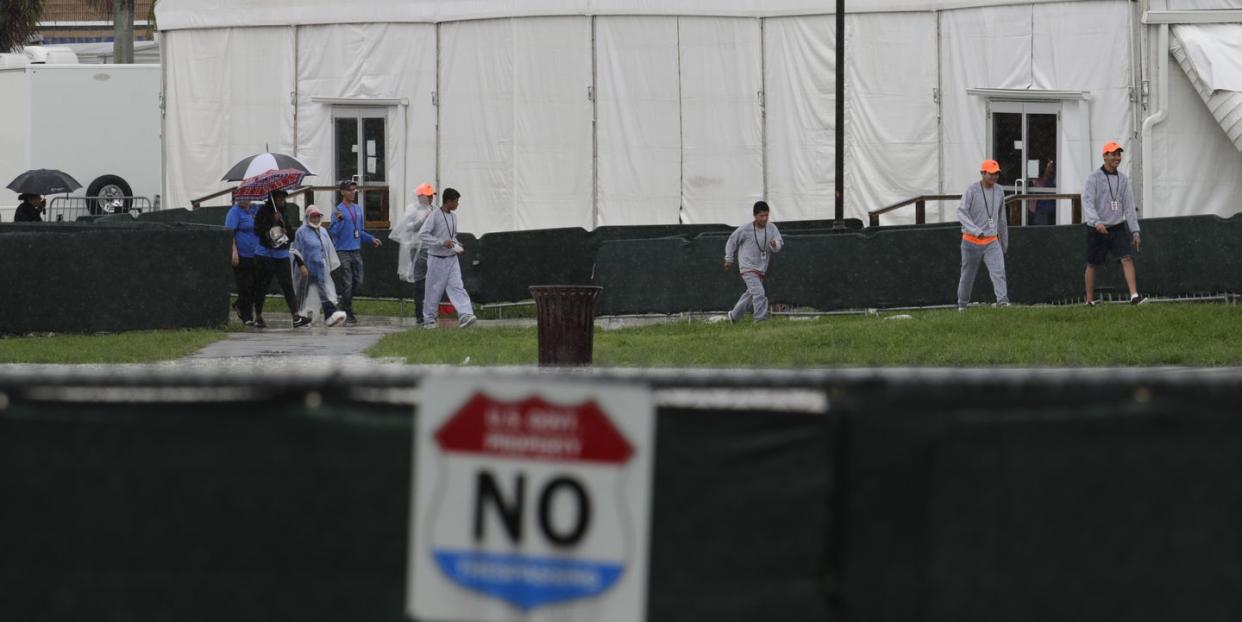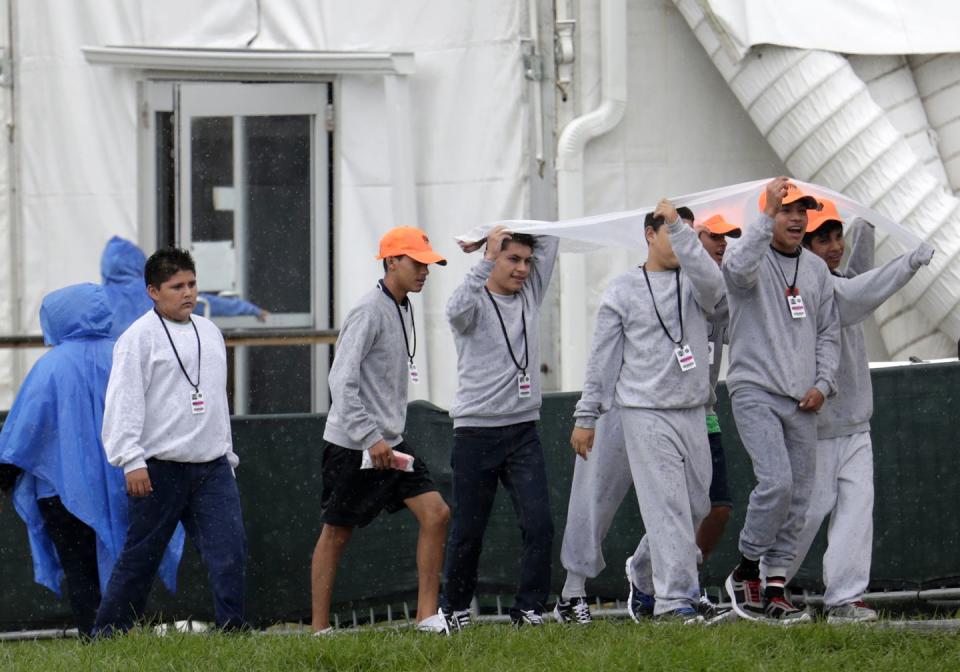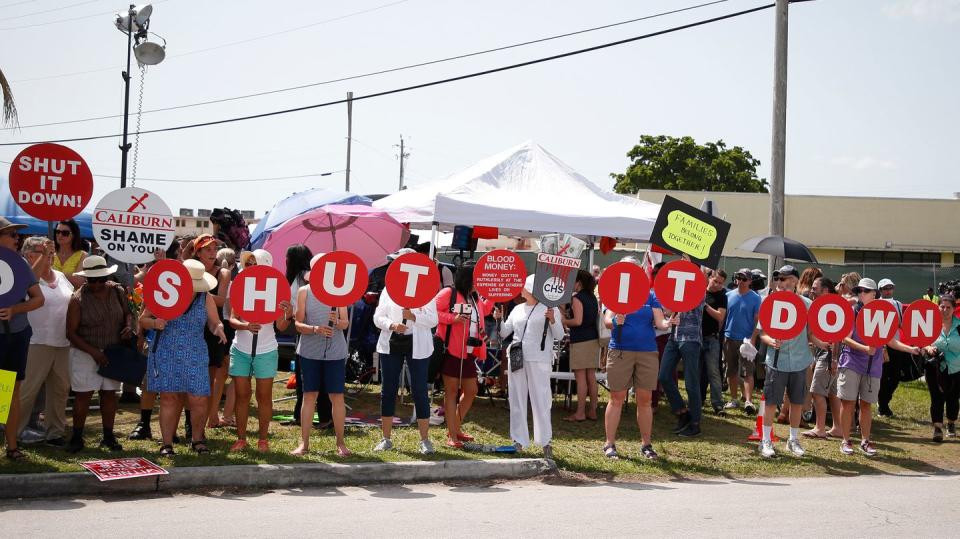At the Homestead Facility for Migrant Children, There's a Crawling Feeling of Ancient Shame

HOMESTEAD, FLORIDA-What in the name of merciful god am I doing on this stepladder? It’s 92 degrees in the flat Florida sun, and the metal struts of the stepladder are hot to the touch, and I am sweating like a thief in church. I am looking across a narrow paved road and over a tall cyclone fence, the links of which are walled off with green canvas. What I am seeing are orange baseball caps on the heads of children who are playing soccer in the brutal, unshaded heat. I am not seeing the actual children. I am not seeing the actual heads, for that matter. I am seeing the orange ball caps, darting and dashing, and I am hearing nothing because I am watching children play in silence.
This was Wednesday morning at the Homestead Air Force Reserve headquarters, which is now home to over 3,500 unaccompanied minor migrant children who are in the custody of the United States Government, but whose incarceration is managed by a private for-profit company. But you don’t really get a feel for the place unless you stay atop the ladder long enough for the game to end. The children leave the field, and they move far enough away from the fence that perspective lengthens and you can see all of them clearly. They line up, heads down, perfectly in formation. And then they walk toward what appears to be a dormitory building, heads down, perfectly in formation, no horseplay, no sign of life, and certainly no sign of childhood, small shuffling steps, and then you realize that, whatever the euphemism du jour is, you are standing on a stepladder, gawking at prisoners, and what you’re looking at is a jail.
There’s a crawling feeling of ancient shame that comes over you. A long time ago, jails and insane asylums used to be the local entertainment. You could throw things at the prisoners or poke the lunatics with sticks. They were human beings who had been commodified by the government of the time as either object lessons or living warnings. Gradually, of course, we became far too civilized to use human beings as objects in service to our own ambitions, or for private profit. We are far too civilized for that. But this place here, with its shuffling, silent children? This is a jail. Any cop would recognize it as a jail. Any CO would recognize it as a jail. The most hardened lifer in solitary would recognize it as a jail. It’s all in the way those children walked, their feet barely leaving the ground.

Every day, activists put up the stepladders and they climb them, waving signs and shouting at the incarcerated children of Homestead. (A little ways down a side road is the facility for detainees between the ages of 16 and 18. When they reach the latter, the detainees are shackled hand and foot and sent off to an adult detention facility.) Every day, they try to give the incarcerated children some hope that there is a world beyond the chain links and green canvas.
These past two weeks, of course, have brought this administration*’s cruel and stupid policies regarding migrant children into stark relief. The details of the horrors of the detention center in Clint, Texas broke through the administration*’s attempted media blackout and nauseated the nation. The photo of the bodies of Oscar and Valeria Martinez, drowned in the Rio Grande, has become as iconic as the picture of Phan The Kim Phuc, scalded by napalm, running down a road in Vietnam. The policy now has an indelible image that cannot be obscured by the blizzard of lies and nonsense emanating from the authors of the policy.
Children are being neglected and abused so that no more children will try to enter this country. They are being commodified by the government* of our time into object lessons and living warnings. They are being put to use in the great project of turning the United States of America into Mordor in the minds of millions of terrified, desperate people in Central America. It feels as though it’s a sin just to gawk at it, even in protest. The inhumanity feels as vast and implacable as the descent of the early summer heat.
And now the circus of a presidential campaign has arrived at Homestead, never, one suspects, to leave. This horrible form of carceral tourism is now as firmly a part of this campaign as buntings and debates. What in the name of merciful god am I doing on this stepladder? What in the name of merciful god am I doing in this country that I no longer recognize as the one in which I was raised? What is happening to us?
“I come from a witnessing tradition to join others to witness,” Elizabeth Warren said. “When we see something that is wrong, we are called on, not to stand idly by, not to look the other way, but to come and to witness. What is happening at Homestead to children-to children-as a direct result of activities by the United States government is wrong. It is a stain on our country, and we must speak out. We speak out as a people. We speak out as moral citizens, not just of the United States, but of the world. We will stay here at Homestead until this facility releases these children and closes this camp.”

This is something of a new fillip in Senator Professor Warren’s campaign. For a while now, in response to the inevitable questions about her faith, which every candidate gets and, Lord, I wish they didn’t, she leans hard into the concept of Christian witness. And there certainly is enough in places like Homestead for someone with some kind of moral conscience to witness.
Last week, the essential Miami New Times published some accounts of life inside the jail at Homestead described by the child inmates themselves. One of the initially striking things about their stories is that Homestead actually seemed better than the other jails through which they’d been shuttled since they came to the United States.
By the time they arrived in Homestead, the migrant children had already taken an unwitting tour through American detention facilities with nicknames such as "la hielera" - "the ice box" - and "la perrera" - "the dog kennel." Some had been separated from their parents at the southern border, usually after begging for a goodbye that guards refused to allow. Several of the teenage girls, despondent after being ripped from their families, were asked to feed, change, and care for the now-parentless babies.
They took in their new surroundings at the Homestead Temporary Shelter for Unaccompanied Children - the tall chain-link fences, the massive white tents, the rows of bunk beds - without knowing exactly where they were or how long they'd be there. Weeks or months later, they'd settled into a routine of classes, counselor-accompanied bathroom breaks, and recreational time in the fenced fields outside the facility. They strove to follow rigid rules that limited phone calls to two a week and banned physical contact of any kind - even hugs and handshakes - fearful that breaking them might mean having to stay longer or even being deported to countries they’d fled because of murderous gangs or stifling poverty. Some had heard the American government might decide they were a "bad person.”
Even the worst criminal stacking time in the worse prison in the country has some vague idea when he might be released, even if it's the slim, vain hope of parole. The inmates in this jail have no idea even if they'll be released, let alone when. They are little lifers, locked up because their parents had the audacity to try and find them a place where they could live into their teens without ducking gunfire.
The accounts from the MNT were drawn from filings in a federal lawsuit in California aimed at forcing the administration* to abide by the regulations mandated by what is called the Flores settlement, a 1997 agreement that set out a series of rules regarding the treatment of minor children being held in detention in places like Homestead. Suffice it to say, this administration* doesn't give a damn. And, while it's not the facility in Texas, it's still undeniably a jail.
It had been weeks since he arrived, shipped to South Florida after being caught by immigration officials when he crossed into the United States and fell to the ground. A Border Patrol agent had put his foot on M.G. and asked, "Do you want to run?" He thought being at the Homestead shelter was almost like being in prison. Guards searched the dorm rooms while the kids were gone and took the cookies M.G. had saved from lunch. He spent his 16th birthday crying. Early last July, he asked to go home. That was when he was sent to the roomful of bunks and left there by himself for more than a week. He never found out why - not even when his mom called the detention center to ask. "I was never told why I was put in there," he said. "When I got out and first felt the sun, it felt amazing."
The two had come to the States together, accompanied by N.J.’s stepmother and 3-month-old sister. They left Guatemala because they were being extorted by gang members with no recourse: Local police did nothing when her father was stabbed and her family was threatened with kidnapping. They crossed the border in Texas and asked for asylum. Immigration officials took them to a facility where they were separated. Again and again, N.J. asked the guards where her father was and if the two could be together. "But they would yell at me telling me to remain quiet and saying that I didn’t belong because the United States government didn’t want Guatemalans, Hondurans, or Salvadorans in the United States," she said.
So, on the morning of the first debate of the 2020 Democratic primary, Senator Professor Warren came to Homestead to witness and to denounce the policy that had broken over the campaign like a thunderstorm. She was denied entry, just as almost everyone is. Katie McGuirl came out to see her, but also because Cindy McGuirl has been standing witness outside Homestead for months now.

"These poor kids are sitting in these tents, and they are the cheapest tents," she said. "They're made of nylon or something. They're not even good Army tents. They must be scared to death.
"You can't bring them a book. You can't bring them anything, and the school system wanted to come and educate them. The superintendent of schools came down and wanted to get in and he wasn't allowed. They come up with these excuses."
McGuirl spent 40 years as a kindergarten and first-grade teacher at Campbell Lane Elementary School, just down the road, where she taught the children of the officers and enlisted of the airbase. She retired in 2000, hated the whole idea of it, and came back to teaching in 2002. "I was in North Carolina at this big house my husband built, and I couldn't adjust," she said. "I couldn't do turkey shoots and tractor-pulls. It's not my thing."
McGuirl lost her house in 1992 when Hurricane Andrew essentially leveled Homestead. She and her husband evacuated their home. Their son stayed and survived by hiding in a sturdy closet while the house blew away around him. It took them nine months to rebuild. For all that time, she essentially was a refugee in her own hometown, and the experience has stayed with her. Now, she stands across the street from the main gate of the place and stands witness to whatever it is might be going on inside.
"If they let me, I'd go in and read to those kids," she says. "I'd do it in a minute."
Respond to this post on the Esquire Politics Facebook page here.
('You Might Also Like',)

